The Manuscript, Memorabilia & Collectibles Auction
Featuring personal belongings of Dodger Great Junior Gilliam
December 1, 2001
(If you have a problem viewing enlarged photos, your browser may be blocking pop-up windows. Check with your IT consultant.)
Autographs
Military Leaders
Lot 155
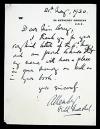

Allenby, Edmund
(1861-1936) British Field Marshall, commanded British troops in their
victory over Turkish-German Army in Palestine. High Commissioner for Egypt
1919-1925.
Autograph Note Signed ("Allenby Field Marshall"). One
page, large octavo, London, May 21, 1930. On "24 Wetherby Gardens" stationery.
To Ida Corey. Lot includes postcard portrait of the General. Soil at top left
corner, bottom right corner; bottom left corner chipped; paperclip stain over
"yrs". Very good condition.
A very nice note to our collector
from the Field Marshall "I thank you for your kind letter... and am proud
thinking that my name will have a place in your memory as well as in your
book."
Estimated Value $75-125.
War of 1812 and the Defense of New York
Lot 156
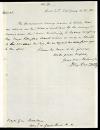

Armstrong, John.
Autograph Letter Signed ("John Armstrong"). One page, quarto, New
York, February 13, 1812. To Major General Dearborn. Accompanied by an 8½
x 12" engraved portrait of General Armstrong. The letter has been trimmed and a
reinforcing strips added to the four sides, foxing throughout, very good to
fine condition.
Commissioned a Brigadier General at the start of the War
of 1812, Armstrong was charged with the defense of New York City and it is in
this capacity that he writes to General Dearborn: "The Government having
reason to believe that an attack on this place is inevitable by the enemy &
having given their order accordingly, it becomes necessary that Major Bouford
should return as early as possible to his post near the city..."
Estimated Value $750-850.
Lot 157
Autopens and General George
C. Marshall. Manuscript Document Signed. Two pages, recto, quarto,
Washington DC, October 3, 1942. On War Department / Office of the Chief of
Staff stationery. To Carolyn D. Young. Transmittal envelope included. Mailing
folds, minor age toning, adhesive residue on verso. Very good
condition.
A very interesting letter from an officer in General
Marshall's office, explaining the function of an autopen: "...The autograph
which you see above is the signature of General Marshall when it was being
recorded on a machine. The machine will be used to sign thousands of letters of
condolence to parents or wives of U. S. Soldiers who are killed or wounded in
this war. The fact that these letters are signed by a machine should be kept a
secret but you can see that it would be impossible for Gen. Marshall to sign
all of them personally and still direct this tremendous war." An important
letter for collectors, detailing military use of the autopen.
Estimated
Value $250-350.
Lot 158


Beauregard, G.T
(1818-1893) Confederate general, he led the troops that fired on Fort
Sumter. Beauregard's other significant Civil War actions include commanding
Confederate troops during the First Battle of Bull Run, defending Charleston
and Petersburg. After the war, he served as a railway executive, supervisor of
the Louisiana Lottery and in various governmental positions in Louisiana. He
remains a popular figure in the South.
Signature ("G.T.
Beauregard"). One page, 7½ x 4½", New Orleans, July 9, 1886.
Ink on cream album page. This lot includes a 1930s illustrated postcard of
Beauregard's monument in New Orleans. Surface soil most noticeable by the date
and at the edges of the paper, the signature and inscription are very clean;
toning to the edges of the page. Very good condition.
Penning an
interesting message (he was an ardent secessionist -- we wonder which "patrie"
he means): "Dieu, honneur et patrie! / I am yrs most truly".
Estimated Value $200-250.
Lot 159
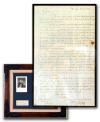

Knox, Henry
(1750-1806). American Revolutionary officer, appointed U.S. Secretary of
War in 1785 largely due to the influence of George Washington.
Letter
Signed ("H Knox"). As Secretary of War. One page, folio, n.p., November
22, 1786. In brown ink. Matted and framed with a black and white image to an
overall size of 27½ x 23½". With one horizontal and two vertical
folds, an area of paper loss at right center edge. Still, in good to very good
condition overall.
In one of the first years of his tenure as Secretary
of War, Knox attempts to convince the Treasury Board that the low morale of
troops may be caused by the shortage of supplies and funds in the battlefield
-- obviously drawing on his experience as a Revolutionary officer. He politely
states the problem as such: "It has been my invariable opinion that every
will of which the troops were capable might be expected to result from their
want of confidence in the public arrangements. I have been convinced that the
defective complyance [sic] of most of the States with the requisitions of
Congress has been the sole cause which has prevented better payments."
Estimated Value $500-700.
Lafayette Wartime Letter -- Superb Content
Lot 160


Lafayette, Marquis de
(1757-1834) French statesman and soldier, hero of the U.S. Revolutionary
War and active in the early phases of the French Revolution, a lifelong
proponent of human rights and liberty.
Autograph Letter. One page,
recto and verso, 7 x 5½", "Frederics Burg", Virginia, April 25,
1781. In English, incomplete and unsigned. The lower portion of the sheet with
the signature is missing. Content and context indicate it was probably destined
for Baron Von Steuben. Transmittal folds, adhesive residue verso. Very good to
fine condition.
Written during the 1781 Virginia Campaign, which ended
with the surrender of Cornwallis at Yorktown, as Lafayette is leading his
troops to Richmond to defend the city and its military stores from the British,
who had just landed at Petersburg. "Your favor of the 21st came this morning
to hand and I have since then received a letter from Governor Jefferson dated
last night werein he informs me that the enemy had landed near Petersburg and
were advancing to that place. What opposition have you been able to make...The
enemy being about Petersburg and being said to intend a visit to Richmond. The
detachment will advance towards that place until intelligence from you enable
me more certainly to determine its movements..." Lafayette reached Richmond
only four days later and thwarted the British plans. Lafayette's leadership was
vital to the success of the Virginia Campaign and the ultimate victory of
American troops. If this letter were intact, it would have a value of $15,000
to $20,000. Regardless, we are fortunate to offer this piece of America's
history.
Estimated Value $3,000-4,000.
Lot 161
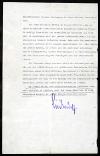

Ludendorff, Erich Friedrich
von (1865-1937) German chief of staff during World War I, he worked with
Hindenburg in engineering many of Germany's victories, including the defeat of
Russia. Ludendorff's own campaigns on the Western Front almost defeated the
Allies. After a brief post-war exile in Sweden, Ludendorff returned to Germany
and plunged into the world of reactionary politics, participating in the Kapp
Putsch (1920) and Hitler's Beer Hall Putsch (1923). As a Nazi member of the
Reichstag (1924-1928), Ludendorff advocated harsh measures against Jews,
Catholics, Masons and Protestants.
Typed Document Signed
("Ludendorff"). In German. As Field Army Chief of Staff. One page, recto
and verso, 8¼ x 13", n.p. (General Headquarters), May 3, 1918. On "Chef
des Generalstabes des Feldheeres" letterhead. To The Chancellor of the Reich.
Being a letter detailing Ludendorff's opinions on firming up economic relations
with Russia, for the post-war benefit of Germany. Accompanied by typewritten
translation. Signed in blue pencil. Contemporary pencil and ink notations. One
horizontal and one vertical fold with some edge separation, small holes and
fold at left edge indicate the document was affixed into a book or file, very
minor age toning at edges. Very good condition.
Reportedly obtained from
Nazi files by an OSS agent at the end of World War II, the significance of this
document is obvious as it outlines Ludendorff's analysis of Germany's post-war
economic position regarding raw materials. The Treaties of Brest-Litovsk,
signed in March of 1918, had reinvigorated the German war effort by effectively
ending the war on the Eastern Front, freeing up troops that were rushed to the
Western Front in hopes of beating the American forces to France, and by
promising a massive economic gain, with Germany in control of over 32% of the
Russian population, 54% of Russia's industrial plants and 89% of Russia's coal
mines. This May letter to the Reichschancellor reflects the new economic
situation and the atmosphere following two months of advances on the Western
Front: "I have given orders to all military units in the East to support
German trade by all possible means...The above order was first of all issued
only with a view to the necessities of a war...we have to count on an economic
war with our Western enemies after the conclusion of the peace...If we do not
succeed in abolishing all difficulties in this respect our economic and
financial importance as well as our military strength will hardly regain its
former standard. It is therefore necessary to take action in order to weaken
the economic war measures of our Western enemies...It will be very important to
intensively use Russia's economic resources. She has plenty and manifold raw
materials and will for a long time require a great many of our industrial
products....raw materials from Russia...will certainly help us over hard times,
serve to diminish our dependency in the economic warfare with our western
opponents and act as price breakers..." Ludendorff's analysis, written
while he was still certain of German victory, anticipated the difficulties of
any peace, but the Armistice, negotiated six months after this letter, found
Germany on the losing side. The Treaty of Versailles did inflict the economic
warfare Ludendorff had predicted, but stripped Germany of the Russian lands and
resources Ludendorff predicted would save the country from the hardships which
(some believe) ultimately fostered the atmosphere leading to the rise of the
Germany's reactionary, nationalistic political climate.
Estimated Value
$1,000-1,500.
Lot 162
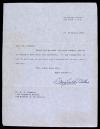

MacArthur, Douglas.
Typed Letter Signed ("Douglas MacArthur"). One page, quarto, New
York, February 21, 1955. On onionskin. To Mr. R.H. Cummins. Lot includes
transmittal envelope and an elaborate, multi-page program from a Los Angeles
American Legion dinner in MacArthur's honor. Lightly penciled notation verso,
transmittal folds, minor toning, else fine.
A wonderful lot for fans of
the General, as the letter is very nice "Thank you so much for your cordial
letter...It was thoughtful of you to write me as you have and I appreciate it
more than I can say" and the program is a great piece of ephemera.
Estimated Value $450-500.
Lot 163
MacArthur, Douglas
(1880-1964) U.S. general. Served with distinction in France during World
War I, commanding general of U.S. forces in Asia during World War II, commanded
the occupation of Japan following the war.
Signature ("Douglas
MacArthur"). One page, 5½ x 2½, n.p., n.d. Clipped signature,
black ink on cream stationery. Slightly ragged bottom edge, black album page
residue visible from verso through to recto, there is one tiny hole above the
signature from removing the album paper, minor surface soil in one area. Very
good condition.
Estimated Value $100-125.
Lot 164
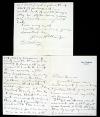

Patton, George S.
Autograph Letter Signed ("George S. Patton Jr"). Six pages, octavo,
Fort Sheridan, Illinois, n.d. On Fort Sheridan stationery. To his mother
("Dear Mama"). Transmittal folds, else fine.
A unique opportunity
and a very personal letter concerning Patton's courting relationship with his
beloved wife Beatrice. Friends since childhood, Beatrice swore at thirteen that
she would marry George Patton or be an old maid and a reciprocal devotion is
expressed clearly in George Patton's letter, which must have been written
between his West Point graduation in 1908 and their marriage in May 1910.
"...Things as I have said are not all settled yet nor have I told Mr. & Mrs.
Ayer of my resolution for various reasons but chiefly because it will make them
feel so badly to loose [sic] B and I would hate to hurt them so soon after they
had been so very nice to me...Indeed Mr. Ayer things it strange that I have not
married B before this. Beat herself is a fool with too much conscience for she
every once in a while gets a notion that as her mother has done so much for her
she should hang around and do things for her mother. I in large measure
indicated such views by pointing out...above all I would not marry her if she
kept me waiting any longer. This worked. And she said she would marry me when I
said so but please not to tell her too soon...She has a hell of a time any how
when ever I leave she crises and is sick in bed for about a week...."
Married for over 30 years, the Pattons were devoted to each other and here we
see the genesis of the formalization of their lifelong love.
Estimated
Value $3,000-4,000.
Lot 165
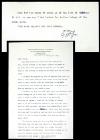

Patton, George S. Typed
Letter Signed ("GSP Jr."). One page, recto and verso, quarto, Fort
Shafter, Hawaii, November 21, 1935. On "Headquarters Hawaiian Department /
Military Intelligence Division / General Staff" letterhead. To "Jerry". Three
words in Patton's hand. Transmittal folds, else fine.
Interesting
content as the world sat on the edge of World War II: "...I am seriously
thinking about buying a ranch on the Island of Hawaii you see it will
eventually belong to the japs and hence will be well governed and free from
Communists, I shall become a Shinto and burn sticks to a flat nosed God and you
can come and live with me and wel will get drunk daily at 10:00 A.M. and so
slosh quickly into the sunset; how about it??? The ranches here more than pay
for them selves in fact when they are well run there is a big profit. the
trouble is to find one...Just for the nonce it looks as if the Dove of Peace
had it all its own way I had looked for better things of the noble bird."
Estimated Value $2,000-2,500.
Lot 166


Perry, Oliver Hazard.
"We have met the enemy and he is ours".
Autograph Letter Signed
[fragment] ("O.H. Perry"). One page, 5 x 3½", n.p. n.d. Black ink
on lined paper. One vertical and two horizontal folds, ink splatters, minor
foxing, minor toning right edge, ¾" edge separation at one horizontal
crease. Strong hand, bold signature. Accompanied by a handsome engraving of
Perry. Very good condition.
Oh, if only we had the rest of this letter!
Penned by a brilliant military man and ardent patriot, the intriguing fragment
we have includes "volunteer in a minute..." One can't help but wonder
about the topic.
Estimated Value $600-700.
Lot 167
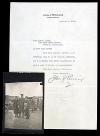

Pershing, John J
(1860-1948) Lifelong soldier, commander of American troops in the
Philippines, West Point instructor, commanded the American Expeditionary Forces
in World War I, named General of the Armies of the United States by Congress
(an honor conferred previously only on George Washington). Foremost American
military officer of the first half of the 20th century.
Typed Letter
Signed ("John J Pershing"). One page, quarto, Washington, DC, October 8,
1931. On Pershing's letterhead. To Ida Corey. Lot includes transmittal envelope
and a photo of Pershing and two female ambulance drivers in France during World
War I (they are named on verso). Two horizontal folds, faint ink transfer in
bottom third, very good to fine condition.
A nice note from the general
to "My dear Miss Corey", thanking her for birthday wishes.
Estimated Value
$75-125.
Lot 168
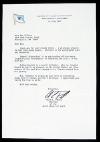

Powell, Colin. Typed
Letter Signed ("C. L. Powell") with piece of Gulf War ephemera. One
page, quarto, Washington DC, July 15, 1993. On "Chairman of the Joint Chiefs of
Staff" stationery. To Bev Bilbury. Transmittal folds. Fine.
Great Gulf
War content "...General Schwarzkopr is an outstanding officer...Saddam Hussein
is a brutal dictator. When he invaded Kuwait he had to be stopped..." The
Coalition propaganda included is a safe conduct leaflet with an outline of the
high quality of life for Iraqi POWs.
Estimated Value $400-500.
Lot 169
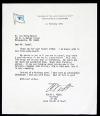

Powell, Colin. Typed
Letter Signed ("C. L. Powell"). As Chairman of the Joint Chiefs of
Staff. One page, small quarto, Washington DC, February 11, 1993. On "Chairman
of the Joint Chiefs of Staff" stationery. To Lee Henry Bachel. Minor crease at
bottom right. Fine.
Responding to an autograph request, Powell offers
encouraging words to a young man.
Estimated Value $250-300.
Lot 170
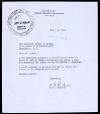

Rickover, Hyman G
(1900-1986) American naval officer and engineer who developed the USS
Nautilus, the first nuclear powered submarine. Rickover also pushed for the
development of nuclear power for peaceful purposes, helping to develop the
first civilian nuclear power plant at Shippingport, Pennsylvania.
Lot
of five Typed Letters Signed ("HS Rickover"). On various submarine
letterheads, one on Atomic Energy Commission letterhead, all addressed to
Thomas Morgan of the House of Representatives, dates 1966-1967. All letters
concern various submarine tests, most notably the Will Rogers (a three page
letter with many biographical details about Rogers). Conditions range from very
good to fine, the only flaws being assorted mailing folds and one paper clip
stain.
Estimated Value $550-650.
Important Civil War Content
Lot 171
Ruggles, Daniel.
Autograph Letter Signed ("Daniel Ruggles/Brig. General"). One page,
small oblong octavo, Port Hudson, Louisiana, August 21, 1862. To General Van
Dorn (his immediate superior). Transmittal folds, minor foxing, pencil notation
verso, else fine.
"Rumoured that the enemy intends evacuating Baton
Rouge -- the absence of gunboats & well this points gives color to the
reports...If so, I shall propose to make towards New Orleans." Federal
forces were occupying Baton Rouge and threatening Vicksburg via the
Mississippi. On August 5, a Confederate force, with two divisions commanded by
Ruggles, had attacked Baton Rouge but was driven back. The rumors Ruggles
relays were correct, on the very day of this note Federal troops evacuated
Baton Rouge without incident.
Estimated Value $900-1,100.
Lot 172
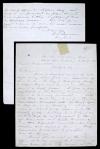

Sherman, William T.
Autograph Letter Signed ("W. T. Sherman Maj Genl"). One page, recto
and verso, quarto, Headquarters 15 Army Corps. Camp Before Vicksburg, March 29,
1863. To "Messrs Harper Brothers." Integral address leaf has separated, is
docketed on verso. Fine. In 1992, this letter sold for $6900.00.
In the
midst of his attempt to capture Vicksburg, Sherman writes to a publisher in New
York about military books: "...The copy of Butterfield Camp & Outpost Duty
is also received and I have given it a hasty glance. It fills a vacuum hitherto
in our Military Manuals and should be extensively circulated. all such Books
must come to us from the War Department, stamped with authority before we can
use it as authority...that Department would purchase large numbers and
distribute them...Should you succeed in this I would advise its publication in
part edition on Linen paper, so as to be carried in the pockets of officers on
outpost duty, and such as are published on paper should have a pliable leather
waterproof cover for similar reasons This to be sure would increase its cost,
but would insure its real value fourfold." On writing this letter, Sherman
had just returned from a reconnaissance expedition up several bayous to
determine the best point to insert his army to the east bank o of the Yazoo
River; a point from which the army could act against Vicksburg. Ultimately,
Grant chose to lay siege to Vicksburg and the city surrendered on July 4, 1863,
thereby giving control of the Mississippi to the Union.
Estimated Value
$3,000-4,000.
Go to Next Catalog Page















